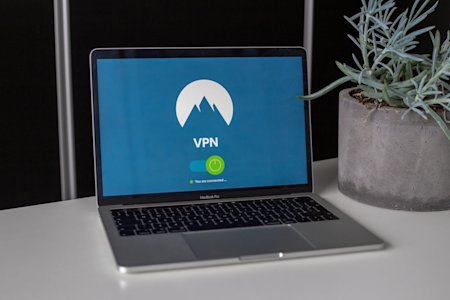In an age where online privacy and security have become increasingly important, the term "VPN" has emerged. A VPN is a service that encrypts your internet connection, ensuring that your online activities remain private and secure, whether you're browsing from home, a public Wi-Fi network, or even another country.
The core function of a VPN is to create a tunnel between your device and the internet. This tunnel protects your data from prying eyes, including hackers, governments, and even your own ISP. By masking your IP address and routing your internet traffic through a remote server, a VPN provides an additional layer of anonymity and security, making it harder for anyone to trace your online actions back to you.
This blog will delve into the meaning and definition of VPNs and explore how they work. We'll also examine the potential risks associated with VPN usage and why modern remote access solutions, like Splashtop, may offer a more efficient and secure alternative for remote work.
VPN Meaning And Definition
A Virtual Private Network (VPN) is a technology that allows users to create a secure and private connection over a less secure network, such as the internet. VPNs are commonly used to protect sensitive data, maintain privacy, and enable access to corporate networks or restricted online content. By encrypting the data transmitted between your device and the internet, a VPN ensures that your online activities remain hidden from prying eyes.
Why Do You Need a VPN?
In today's digital landscape, the need for online privacy has never been greater. Here are some key reasons why you might need a VPN:
Online Privacy: A VPN hides your IP address and encrypts your internet connection, ensuring that your browsing activities are private and cannot be easily tracked by ISPs, advertisers, or government agencies.
Security on Public Wi-Fi: Public Wi-Fi networks, such as those found in cafes, airports, and hotels, are often unsecured and vulnerable to hacking. A VPN protects your data from being intercepted by encrypting your connection.
Access to Restricted Content: Many online services, such as streaming platforms and websites, restrict access to content based on geographic location. A VPN allows you to bypass these restrictions by masking your location.
Avoiding Censorship: In some countries, access to certain websites and online services is restricted by government censorship. A VPN enables you to circumvent these restrictions and access the internet freely.
How Does a VPN Work?
A VPN works by routing your device's internet connection through a private server rather than your Internet Service Provider (ISP). When you connect to the internet using a VPN, the VPN acts as an intermediary between your device and the internet, encrypting your data as it travels through the network.
Here’s a step-by-step breakdown of how a VPN works:
Connection to the VPN Server: When you initiate a connection to a VPN, your device connects to a VPN server via an encrypted tunnel. This tunnel is created using various encryption protocols, such as OpenVPN, IKEv2, or WireGuard.
Data Encryption: As your data travels through this encrypted tunnel, it is secured using encryption algorithms. This means that even if a hacker were to intercept your data, they would not be able to read or understand it.
IP Address Masking: The VPN server assigns a different IP address to your connection. This new IP address is typically located in a different region or country, making it appear as though you are browsing the internet from that location.
Data Transmission: Once your data reaches the VPN server, it is decrypted and sent to its final destination on the internet. The website or service you are accessing sees the IP address of the VPN server instead of your actual IP address, protecting your identity and location.
Return Data: The process is reversed for data coming back to your device. The VPN server receives the data, encrypts it, and sends it back through the secure tunnel to your device, where it is decrypted and made available to you.
Types of VPN
There are several types of VPNs, each designed for different use cases:
Personal VPN: Also known as a consumer VPN, this type of VPN is commonly used by individuals to secure their internet connection and maintain privacy while browsing. Personal VPNs are typically easy to set up and provide access to servers in multiple locations worldwide, allowing users to bypass geo-restrictions and censorship.
Site-to-Site VPN: This type of VPN is used primarily by businesses to connect multiple office locations over the internet. A site-to-site VPN allows employees at different locations to access each other's resources as if they were on the same local network.
Client-to-Server VPN: A client-to-server VPN requires the installation of VPN software on the user's device. This software is configured to connect to a specific server, typically within a company’s network. Once connected, the user can access the network’s resources as if they were physically present in the office.
Key Benefits of VPN
Using a VPN offers several significant benefits, including:
Enhanced Security: By encrypting your internet connection, a VPN protects your data from being intercepted by hackers, especially when using public Wi-Fi networks.
Increased Privacy: A VPN hides your IP address and browsing activities from your ISP, advertisers, and government agencies, helping to maintain your anonymity online.
Bypass Geo-Restrictions: A VPN allows you to access content that may be restricted in your geographic location by making it appear as though you are browsing from a different region.
Avoid Censorship: In regions where internet access is restricted or censored, a VPN enables you to bypass these controls and access the web freely.
What Are the Potential Risks of Using a VPN?
While VPNs offer numerous benefits, including enhanced privacy and security, they are not without potential risks. Understanding these risks is crucial for making an informed decision about whether and how to use a VPN. Here are some of the primary concerns:
1. False Sense of Security
One of the most significant risks of using a VPN is developing a false sense of security. While a VPN encrypts your internet traffic and masks your IP address, it doesn’t make you invulnerable to all online threats. For example, a VPN cannot protect you from phishing attacks, malware, or other forms of cybercrime that target users directly. Additionally, if the VPN provider does not implement robust security practices, your data could still be at risk.
2. Potential Logging and Data Collection
Not all VPN providers are transparent about their logging practices. Some VPNs, particularly free or low-cost options, may collect and store user data, including browsing history, connection timestamps, and IP addresses. This data can potentially be sold to third parties or handed over to authorities if requested, undermining the privacy that users seek by using a VPN in the first place.
3. Jurisdictional Issues
The country in which a VPN provider is based can have a significant impact on user privacy. VPN providers operating in countries with mandatory data retention laws or those that are part of international intelligence-sharing agreements (such as the Five Eyes alliance) may be legally compelled to store and share user data. Even if the provider claims to have a no-logs policy, they may still be required to retain certain information under local laws.
4. VPN Security Vulnerabilities
VPNs themselves can be targets for cyberattacks. Vulnerabilities in VPN software or protocols can expose users to security risks, including data leaks and unauthorized access to sensitive information. For example, outdated encryption protocols or poor implementation of security features can make the VPN less secure. Additionally, some VPN services have been found to leak DNS queries, which can reveal the websites you visit even when connected to a VPN.
5. Slower Internet Speeds
Using a VPN can slow down your internet connection, as your data is routed through an additional server, and encryption adds processing overhead. While this is not a security risk per se, it can impact your online experience, particularly when streaming, gaming, or downloading large files. In some cases, the slowdown can be significant, making the VPN less practical for everyday use.
6. Incompatibility with Certain Services
Some websites and online services actively block VPN traffic, preventing you from accessing content while connected to a VPN. This is particularly common with streaming platforms like Netflix, which may restrict content based on your geographic location. Additionally, online banking services may flag VPN usage as suspicious activity, leading to account access issues.
7. Legal and Ethical Considerations
In some countries, using a VPN is restricted or outright illegal. While VPNs are a legitimate tool for protecting privacy, using one in a jurisdiction where it is banned can result in legal consequences. Even in countries where VPN use is allowed, using a VPN to engage in illegal activities, such as accessing restricted content or conducting cybercrimes, can lead to severe penalties.
8. Trustworthiness of VPN Providers
The VPN industry is largely unregulated, which means that not all providers operate with the same level of integrity. Some providers may mislead users about their services, such as by falsely claiming to offer no-logs policies or by exaggerating the level of security provided. It’s essential to research and choose a reputable VPN provider with a proven track record.
Beyond VPN: Why Remote Access is Superior to VPN for Remote Work
As remote work becomes the norm, businesses are seeking the most efficient and secure ways to connect employees with company resources. Traditionally, VPNs have been the go-to solution, creating tunnels between remote devices and corporate networks. However, they are increasingly being overshadowed by remote access solutions like Splashtop.
Here’s how remote access is superior to VPN when it comes to enabling remote work:
Performance and Speed
One of the key limitations of VPNs is their impact on internet speed. Since a VPN routes your connection through an additional server, it can introduce significant latency, particularly when dealing with large files or resource-intensive applications. In contrast, remote access software like Splashtop is designed for high-performance remote work, ensuring minimal latency and smooth operation even under demanding conditions. With optimized data transmission and efficient resource use, remote access solutions provide a faster, more responsive experience compared to traditional VPNs.
Security
While VPNs encrypt your internet connection, they can also introduce security risks. Once a device is connected to a company’s network via VPN, any vulnerabilities on that device can potentially be exploited to compromise the entire network. Remote access software offers a more secure alternative by allowing users to access specific devices without exposing the whole network. Features like two-factor authentication, session encryption, and device authentication add additional layers of protection, making remote access solutions inherently more secure than VPNs.
Ease of Use and Accessibility
Setting up and maintaining a VPN can be complex, requiring technical knowledge and continuous management, particularly when changes are made to network settings. Remote access solutions like Splashtop, on the other hand, offer a much simpler and more intuitive setup. Users can easily connect to their work computers from any device, anywhere, with minimal technical barriers. This ease of use not only enhances productivity but also reduces the burden on IT support teams.
User Experience
VPNs extend the network to the user’s device, which can lead to a disjointed experience as users must manually locate and open files or applications. Remote access software, however, provides a seamless experience where users can control their remote computer as if they were sitting right in front of it. This includes access to all applications, files, and even multiple monitors, making remote work as close to in-office work as possible.
Cost-Effectiveness
Finally, VPNs often require significant investment in hardware and ongoing maintenance, which can be costly, especially for small to medium-sized businesses. In contrast, remote access solutions like Splashtop are software-based, offering straightforward pricing models without the need for expensive infrastructure. This makes remote access not only more efficient but also more cost-effective in the long run.
While VPNs have served a critical role in the evolution of remote work, remote access solutions like Splashtop offer a superior alternative to VPN in terms of performance, security, ease of use, user experience, and cost-effectiveness. As more businesses transition to remote work, the advantages of remote access software over VPNs become increasingly clear.
Next-Generation Alternative to VPNs for Secure Remote Connectivity
As businesses evolve and the need for secure remote connectivity becomes paramount, traditional VPNs are increasingly being replaced by next-generation solutions like Splashtop. Splashtop offers a robust and secure alternative that goes beyond the limitations of VPNs, providing a seamless, high-performance remote access experience.
Why Splashtop?
Superior Security: Splashtop leverages advanced security features, including 256-bit AES encryption, two-factor authentication, and device authentication, ensuring that your remote sessions are as secure as possible.
Enhanced Performance: Splashtop is designed to deliver high-speed, low-latency connections, allowing you to work remotely with the same responsiveness as if you were on-site. Whether you’re editing videos, accessing large files, or running resource-intensive applications, Splashtop ensures smooth performance without the lag commonly associated with VPNs.
Ease of Use: Splashtop’s intuitive interface makes it easy for users of all technical levels to connect to their remote devices. The setup is straightforward, and there’s no need for the complex configurations that VPNs often require. Simply log in and start working, from any device, anywhere.
Cost-Effective: Unlike VPNs, which often involve significant upfront costs for hardware and ongoing maintenance, Splashtop offers a more affordable solution with flexible pricing plans. This makes it ideal for businesses of all sizes, providing enterprise-level remote access without breaking the bank.
Comprehensive Access: With Splashtop, you get more than just remote connectivity. You have full access to all your desktop applications, files, and even multiple monitors, giving you the flexibility to work as if you were physically present in the office.
Switch to Splashtop: A More Efficient and Secure Alternative to Traditional VPNs for Remote Work
In today's fast-paced digital world, the limitations of traditional VPNs are becoming increasingly apparent. Splashtop offers a more efficient, secure, and user-friendly alternative for remote work. With Splashtop, you can experience high-performance remote access with robust security features, ease of use, and cost-effectiveness that surpasses what VPNs can offer.
Whether you’re managing a remote team or simply need reliable remote access, Splashtop is the solution you’ve been looking for. Don’t just take our word for it—experience the difference yourself. Start your free trial of Splashtop today and discover a better way to work remotely.





